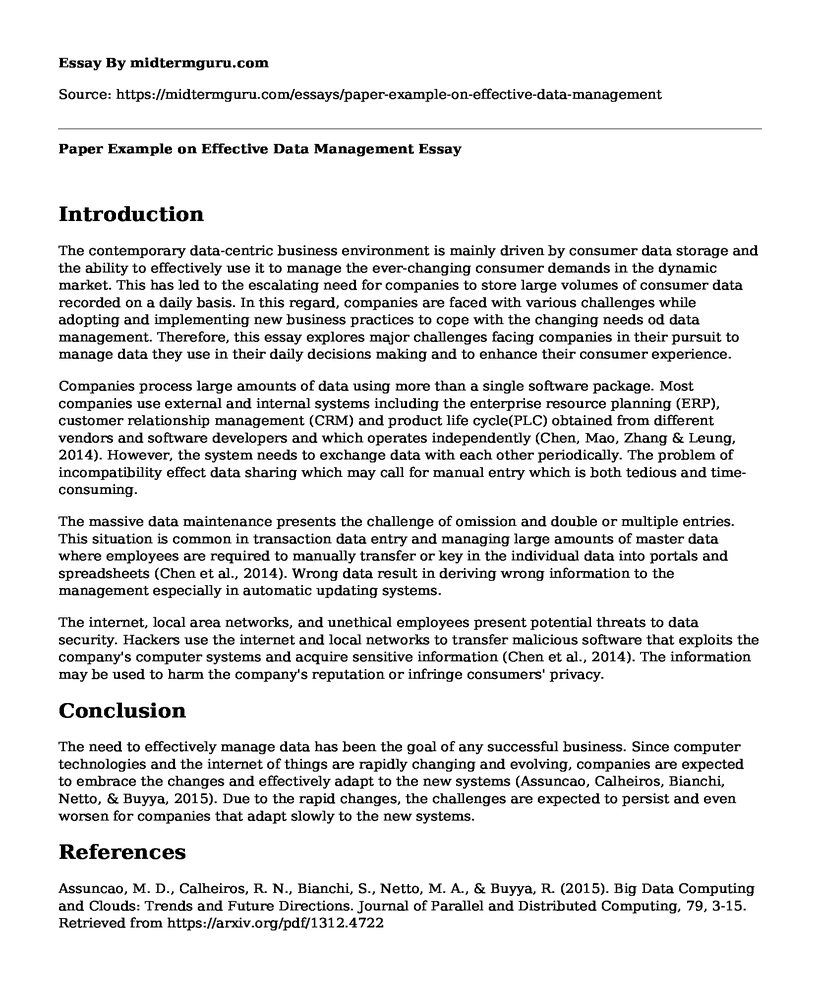Introduction
The contemporary data-centric business environment is mainly driven by consumer data storage and the ability to effectively use it to manage the ever-changing consumer demands in the dynamic market. This has led to the escalating need for companies to store large volumes of consumer data recorded on a daily basis. In this regard, companies are faced with various challenges while adopting and implementing new business practices to cope with the changing needs od data management. Therefore, this essay explores major challenges facing companies in their pursuit to manage data they use in their daily decisions making and to enhance their consumer experience.
Companies process large amounts of data using more than a single software package. Most companies use external and internal systems including the enterprise resource planning (ERP), customer relationship management (CRM) and product life cycle(PLC) obtained from different vendors and software developers and which operates independently (Chen, Mao, Zhang & Leung, 2014). However, the system needs to exchange data with each other periodically. The problem of incompatibility effect data sharing which may call for manual entry which is both tedious and time-consuming.
The massive data maintenance presents the challenge of omission and double or multiple entries. This situation is common in transaction data entry and managing large amounts of master data where employees are required to manually transfer or key in the individual data into portals and spreadsheets (Chen et al., 2014). Wrong data result in deriving wrong information to the management especially in automatic updating systems.
The internet, local area networks, and unethical employees present potential threats to data security. Hackers use the internet and local networks to transfer malicious software that exploits the company's computer systems and acquire sensitive information (Chen et al., 2014). The information may be used to harm the company's reputation or infringe consumers' privacy.
Conclusion
The need to effectively manage data has been the goal of any successful business. Since computer technologies and the internet of things are rapidly changing and evolving, companies are expected to embrace the changes and effectively adapt to the new systems (Assuncao, Calheiros, Bianchi, Netto, & Buyya, 2015). Due to the rapid changes, the challenges are expected to persist and even worsen for companies that adapt slowly to the new systems.
References
Assuncao, M. D., Calheiros, R. N., Bianchi, S., Netto, M. A., & Buyya, R. (2015). Big Data Computing and Clouds: Trends and Future Directions. Journal of Parallel and Distributed Computing, 79, 3-15. Retrieved from https://arxiv.org/pdf/1312.4722
Chen, M., Mao, S., Zhang, Y., & Leung, V. C. (2014). Big Data: Related Technologies, Challenges, and Future Prospects. Retrieved from http://mmlab.snu.ac.kr/~mchen/min_paper/2014/2014-29-Springer-1-BigDataBook.pdf
Cite this page
Paper Example on Effective Data Management. (2022, Sep 13). Retrieved from https://midtermguru.com/essays/paper-example-on-effective-data-management
If you are the original author of this essay and no longer wish to have it published on the midtermguru.com website, please click below to request its removal:
- Dominos Pizza Company Analysis - Paper Example
- Annotated Bibliography on Management: Collection Management Strategies in Hard Times
- Forecasting Case Study Paper Example: Urban Planning
- The Business Strategies of the United Fruit Company - Paper Example
- Sutter Health - Essay Sample
- Maintaining Safe Work Environments: Manager's Role & OSHA Compliance - Essay Sample
- Ogilvy Company PR Analysis: Functions, Tools, and Technologies - Essay Sample







